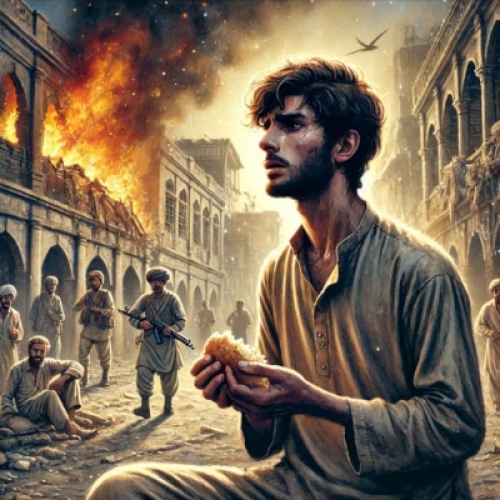The aroma of freshly baked parathas wafted through the narrow streets of Dhaka. Sheheryar, a Punjabi baker, stood behind his counter, kneading dough with practiced hands. He had come to East Pakistan from Lahore years ago, drawn by the opportunities in this bustling city. His bakery had thrived for years, attracting Bengalis and Punjabis alike. But now, the streets were silent, the air heavy with fear and suspicion.
The civil war had torn the city apart. The Mukti Bahini rebels and the Pakistan Army were engaged in a brutal conflict, and neighbors who once broke bread together now eyed each other with distrust. Sheheryar, though Punjabi, had always been kind to his Bengali customers. But kindness was no longer enough. He was now seen as an outsider - a symbol of the oppressors by some, and a potential traitor by others.
One night, as Sheheryar was locking up his shop, he heard a faint knock on the back door. Opening it cautiously, he found a boy no older than twelve, his face streaked with tears, his thin body trembling.
"Amma is hungry," the boy whispered in Bengali, his voice barely audible.
Sheheryar hesitated. He knew the risks of helping anyone now - especially Bengalis. The army patrolled the streets ruthlessly, and aiding someone on the other side of the divide could mean death. But hunger had no language, no ethnicity. He handed the boy a stack of warm parathas.
"Take these and go. Quickly."
The boy hesitated. "There are more people? in the old warehouse. They're hiding."
Sheheryar stared at the boy. His hands trembled as he gripped the doorframe. He knew what it meant to get involved. But before he could answer, the boy disappeared into the darkness.
For days, Sheheryar baked in silence, his thoughts consumed by the boy and the unseen faces in the warehouse. He avoided looking at the soldiers who marched past his shop. The city's air was thick with gunpowder and whispers of death. But one night, unable to bear it any longer, he packed a basket of parathas and ventured into the shadows.
The warehouse was hidden in a derelict part of the city. Inside, he found dozens of Bengalis - men, women, and children. Their faces were gaunt, their eyes hollow. They stared at him in silence, suspicion etched into their features.
"I brought food," he said simply, setting down the basket.
The silence broke as they descended upon the bread, devouring it hungrily. Sheheryar sat against the wall, watching them. For the first time in weeks, he felt something other than fear - he felt purpose.
Night after night, Sheheryar continued his secret mission, bringing bread to the warehouse. Each time, he avoided the army patrols and the Mukti Bahini fighters, knowing that discovery would mean death. The city grew more violent, but he persisted, driven by the sight of the boy's mother smiling weakly as she ate.
One night, as he approached the warehouse, the air was unusually still. The usual whispers of the city's unrest seemed to have vanished. He turned a corner - and froze.
Soldiers surrounded the warehouse, their rifles pointed at the crumbling structure. Sheheryar's heart pounded as he saw the boy being dragged out, screaming for his mother. The soldiers began shouting orders, preparing to storm the building.
Sheheryar stepped forward, his basket of bread in his hands. "Wait!" he shouted.
The soldiers turned, their eyes narrowing at the sight of him. "What are you doing here, Sheheryar?" one of them demanded. "These people are enemies of the state."
"They're just hungry," he replied, his voice shaking but firm.
The officer sneered. "You're helping them? You, a Punjabi?"
"They're humans," Sheheryar said. "Hunger doesn't care about sides."
The officer raised his rifle, and for a moment, time seemed to stop. Sheheryar closed his eyes, clutching the basket as the sound of a gunshot shattered the night.
When he opened his eyes, he was on the ground, his chest burning. The bread had scattered across the dirt, trampled by boots. He saw the boy's face, pale and frozen, as the soldiers dragged him away. The last thing Sheheryar saw before the world faded was a woman's hand reaching for a piece of bread, her fingers trembling as she lifted it to her lips.
The next morning, the streets of Dhaka smelled of smoke and gunpowder. The bakery's oven lay cold, its flames extinguished. But somewhere in the city, the boy's mother clutched a piece of bread, its warmth a fleeting memory of humanity in a world gone mad.
---
Written by Faraz Parvez, pseudonym of Arshad Afzal.




